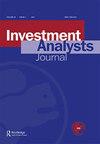零利率环境下股票市场指数估值的修正Shiller周期性调整市盈率(CAPE)比率
IF 2.2
4区 经济学
Q3 BUSINESS, FINANCE
引用次数: 0
摘要
摘要周期性调整市盈率(CAPE)是一种被广泛用于预测市场回报的工具。然而,最近,其预测强度的恶化已经浮出水面。与此同时,全球长期利率已经下降,预计将保持在历史低点,而CAPE没有考虑到这一点。忽略了对资本成本对CAPE作为估值工具的有效性的影响,这代表了知识上的差距。这项研究使用了一个修正的CAPE来解释利率,称为超额CAPE收益率(ECY),为预测全球股市回报提供了一个替代的——并且可能得到改进的——模型。我们发现,当实际利率在3%至5%之间时,CAPE达到峰值,而ECY未能提高CAPE的预测能力。本文章由计算机程序翻译,如有差异,请以英文原文为准。
A modified Shiller's cyclically adjusted price-to-earnings (CAPE) ratio for stock market index valuation in a zero-interest rate environment
ABSTRACT The cyclically adjusted price-earnings ratio (CAPE) is a tool that has become widely used to predict market returns. However, recently, deterioration in its forecast strength has surfaced. At the same time, global long-term interest rates have declined and are expected to remain at record lows, which the CAPE fails to consider. Omitting to fully examine the impact of the cost on capital on the effectiveness of CAPE as a valuation tool represents a gap in knowledge. This study uses a modified CAPE to account for interest rates, known as the excess CAPE yield (ECY), to offer an alternative – and potentially improved – model for predicting global stock market returns. We find that CAPEs peak when real interest rates are between 3% and 5%, while the ECY fails to improve on the predictive abilities of the CAPE.
求助全文
通过发布文献求助,成功后即可免费获取论文全文。
去求助
来源期刊

Investment Analysts Journal
BUSINESS, FINANCE-
CiteScore
1.90
自引率
11.10%
发文量
22
期刊介绍:
The Investment Analysts Journal is an international, peer-reviewed journal, publishing high-quality, original research three times a year. The journal publishes significant new research in finance and investments and seeks to establish a balance between theoretical and empirical studies. Papers written in any areas of finance, investment, accounting and economics will be considered for publication. All contributions are welcome but are subject to an objective selection procedure to ensure that published articles answer the criteria of scientific objectivity, importance and replicability. Readability and good writing style are important. No articles which have been published or are under review elsewhere will be considered. All submitted manuscripts are subject to initial appraisal by the Editor, and, if found suitable for further consideration, to peer review by independent, anonymous expert referees. All peer review is double blind and submission is via email. Accepted papers will then pass through originality checking software. The editors reserve the right to make the final decision with respect to publication.
 求助内容:
求助内容: 应助结果提醒方式:
应助结果提醒方式:


